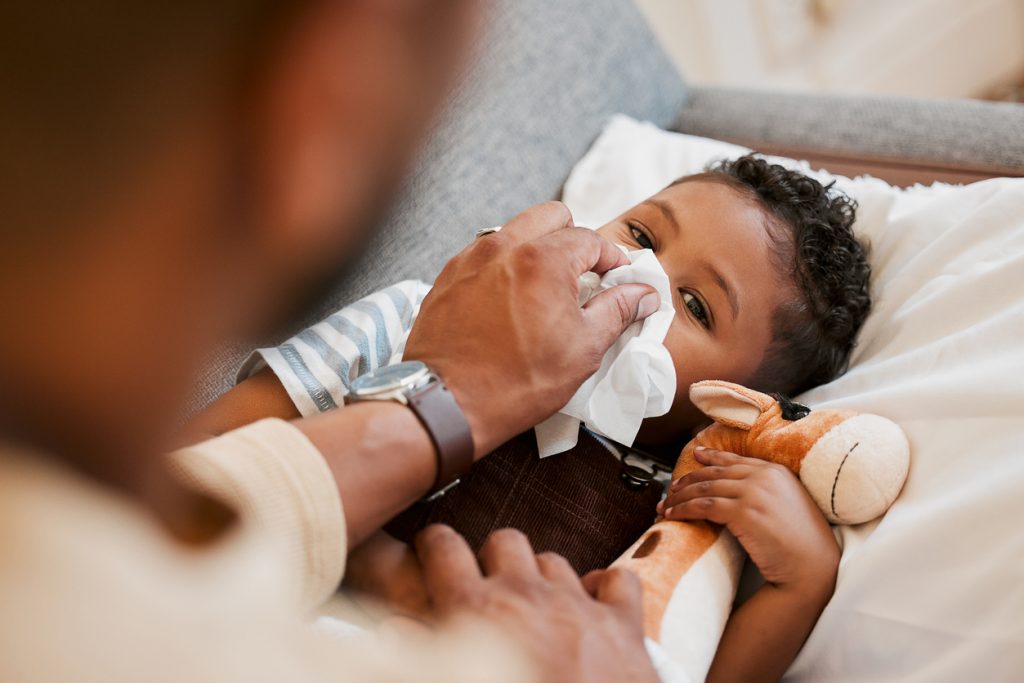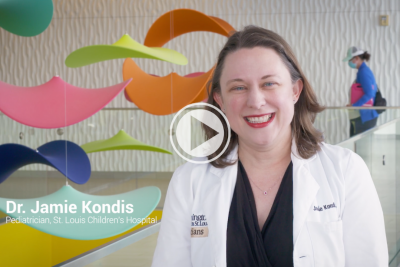Fall is here, but so are kids’ nasal allergies and respiratory infections. And, this year again, there has been a spike in respiratory infections caused by the Respiratory Syncytial Virus (RSV). As a pediatrician working in the emergency room, we often see surges of viral illnesses during fall and winter months. We especially see RSV, flu, and rhinovirus infections.
I’ve gathered what you should know about RSV in kids so you can be prepared for this surge, along with updating you on new information regarding the adult RSV vaccination options and the pediatric monoclonal antibody therapy approved for kids.
What is RSV?
RSV, or Respiratory Syncytial Virus is one of the many viruses that infect the respiratory tract. It starts out with a runny nose, cough, and low-grade fevers like a common cold. According to the Centers for Disease Control (CDC), RSV leads to over 2 million outpatient visits annually in the U.S. They also see between 58,000 and 80,000 hospitalizations and 100–300 deaths among children under five years old. For patients 65 or older, each year brings about 60,000–120,000 hospitalizations and 6,000–10,000 deaths.
How Does RSV Spread?
RSV can spread from person to person through secretions and contaminated objects. Sneezing or coughing can spread RSV. It can remain on hard surfaces for several hours and softer surfaces like sheets, blankets, and stuffed animals for some time.
Who’s at Risk for RSV?
In most healthy kids and adults, you can treat RSV at home with fluids and fever medications. It runs its course as a cold-like illness. However, those people can transfer RSV to younger kids or older adults. RSV is most dangerous, and potentially fatal, in babies who are born prematurely and people of any age with weak immune systems, heart disease, or lung disease. Even babies who were born full-term and healthy can sometimes develop severe symptoms.
What are the Symptoms of RSV?
RSV infection starts like a common cold and usually resolves in a few days. However, it can sometimes spread from the upper airways to the lower smaller airways and cause a condition called bronchiolitis. These babies can have increased mucus production in their airways, leading to symptoms such as coughing, wheezing, rapid breathing, and potentially respiratory failure and the need for hospital admission to help maintain their oxygen levels and hydration. Very sick babies with RSV can end up in the intensive care unit and may even need mechanical ventilation.
What to Look For with an RSV Infection?
RSV typically starts with cold-like symptoms – cough, runny nose, and congestion. These symptoms usually peak around day four to five of the illness. You can get RSV multiple times–even during a single season, but repeat infections are mostly less severe than the first one.
What is the Best Way to Prevent RSV?
RSV can spread from person to person through secretions and contaminated objects. It’s helpful to:
- Talk to your doctor to see if you or your child is eligible for the RSV immunization. This will help lessen the likelihood of severe effects from RSV.
- Practice a lot of handwashing.
- Wipe down common surfaces like tables, counters, or trays.
- Avoid exposing your children to sick people and crowded areas during the peak season from November to March. Keep kids home from school or daycare if they are sick.
- Connect with your pediatrician, urgent care, or After Hours if they start to show symptoms, especially in children under age two.
What are Synagis and Nirsevimab?
Beyfortus (nirsevimab) and Synagis (palivizumab) are both monoclonal antibody injections given to prevent serious respiratory illness from RSV in children entering their first (or sometimes second) RSV season. Synagis has been around for over 20 years. It is given to high-risk babies and helps prevent contracting RSV in preterm babies, who are considered a high-risk population. It is a series of four to six monthly shots given during the peak season. Your pediatrician will let you know if your baby is a candidate for Synagis. Also, you’ll want to make sure your baby is up to date on their immunizations. Like any other viral infection, RSV can weaken the immune system and make your baby susceptible to other bacterial infections.
In July 2023, a new long-acting monoclonal antibody therapy called Nirsevimab was approved by the FDA. It is a single injection and can be given with other age-appropriate childhood vaccines. Studies show that protection from Nirsevimab lasts for about five months, which is good because the typical RSV season lasts for four to five months. The CDC recommends one dose of Nirsevimab for ALL infants younger than eight months during their first RSV season, which is typically fall through spring. For children between 8 and 19 months old who are at increased risk of severe RSV disease, such as severely immunocompromised kids, a dose is recommended in their second season.
What is the Adult RSV Vaccine?
In May 2023, the U.S. Food and Drug Administration approved the first RSV vaccine approved for use in the U.S. for the prevention of lower respiratory tract disease caused by RSV in individuals 60 years of age and older.
- Currently there are two RSV vaccines approved for adults ages 60 years and older – RSVPreF3 (Arexvy from GSK) and RSVpreF (Abrysvo from Pfizer).
- For now, only one dose of the RSV vaccine is recommended, which appears to provide protection for at least two RSV seasons. Further studies are planned to evaluate how long the protection lasts and whether additional doses will be needed.
- Abrysvo is the only maternal RSV vaccine that is FDA approved, and CDC recommended for use in 32 to 36 weeks gestational age of pregnancy, using seasonal administration( as a single dose) from September through January. This vaccine helps a pregnant person produce protective antibodies that they pass on to the fetus through the placenta to help protect babies from birth to six months.
What is the Treatment for RSV?
There is no specific medication to cure RSV, and medications like steroids and antibiotics do not help with RSV. Healthcare providers do not routinely recommend Nebulizer treatments to help with wheezing for bronchiolitis. Families can treat RSV symptoms at home with many common over-the-counter medications and items from the store.
It’s helpful to have the below on hand during RSV/cold/flu season:
- Fever medicines such as Tylenol or ibuprofen.
- Nasal saline drops and gentle suctioning. This will help to clear the nose to make feeding and sleeping easier.
- Cool-mist vaporizer helps keep the air moist and can help with your child’s breathing.
- Home heating systems in wintertime can reduce air humidity, dry out the airways, and thicken nasal secretions.
- Be careful to avoid steam and hot-air humidifiers, which can cause scalding.
- Drinks that maintain hydration.
- Birth – 12 months: Breastmilk, formula, and water.
- 12 months and up: Water is best, but low-sugar sports drinks, Pedialyte, and juices can also help – avoid drinks with caffeine, as that can dehydrate kids.
Where and When to Seek Help for RSV?
If your child starts with cold-like symptoms but then starts to have rapid breathing, chest retractions, grunting, increased fussiness, poor feeding, dehydration, and/or lethargy, then it is time to seek help. Doctors will diagnose RSV infection with a nasal swab. Treatment includes checking the oxygen saturations and your baby’s hydration status. They may need chest X-ray, IV fluids, and further interventions based on how sick the baby looks.
Our Washington University Children’s After Hours locations provide convenient medical care for your child’s illnesses and injuries as a faster alternative to E.R.s when your pediatrician’s office is closed. For most cases, children can be seen here or in a BJC Medical Group Convenient Care, rather than in the E.R.
In case of a medical emergency with a child, determine where the nearest accredited, Level I pediatric trauma center is located. St. Louis Children’s Hospital has six pediatric E.R. locations across the St. Louis and southern Illinois region. These include St. Louis Children’s Hospital, Children’s Hospital at Memorial Hospital Belleville, Children’s Hospital at Memorial Hospital Shiloh, Children’s Hospital at Missouri Baptist Medical Center, Children’s Hospital at Northwest HealthCare, and Children’s Hospital at Progress West Hospital.






Comments